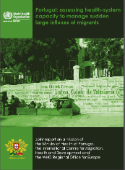Portugal: assessing health-system capacity to manage sudden large influxes of migrants(2014).

Download
2014, xviii + 217 pages
ISBN 978 92 890 5072 2
This publication is only available online.
Sudden influxes of migrants have occurred on several occasions in the countries of the WHO European Region over recent years, posing significant challenges to recipient countries’ health systems and requiring basic services to be scaled up to facilitate the appropriate response to migrants’ essential needs and to fulfil their fundamental human rights. The unpredictability of migration requires Member States to strengthen their health systems’ preparedness to manage a potential large influx of displaced populations and to invest in emergency management capabilities and effective multisectoral coordination mechanisms. Influxes in southern European countries in particular underlined the need to identify best practices, share experiences and start an efficient policy dialogue between stakeholders.
With this in mind, Portugal’s Ministry of Health and the WHO Regional Office for Europe jointly assessed the capacity of the country’s health system to manage large influxes of migrants. Portugal is taking measures consistent with World Health Assembly resolution WHA 61.17 of 2008 and the Global Consultation on Migrant Health of 2010 in Madrid, Spain. In several ways, Portugal could be seen as model for migrant-integration practices, although there is scope to strengthen planning and surge capacity.
The assessment was made within the framework of the Regional Office’s Public Health Aspects of Migration in Europe project, which, sustained by a direct contribution from the Italian Ministry of Health, supports work in the WHO European Region to strengthen national and local capacities to address migrants’ health needs. The assessment was also conducted within the framework of the new WHO European health policy, Health 2020, which addresses issues related to population vulnerability and human rights.



